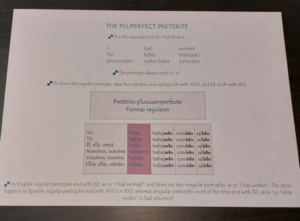![]() This tense works in the same way in English and Spanish. Basically, we use it when one thing happened before the other, and both are in the past tense. For example:
This tense works in the same way in English and Spanish. Basically, we use it when one thing happened before the other, and both are in the past tense. For example:
When she arrived, I had already finished the job. Cuando ella llegó, yo ya había terminado el trabajo.
She arrived in the past and I finished the job in the past, but I finished before her arrival. To express this, we use the Pluperfect (había terminado). Pluperfect is pluscuamperfecto, meaning “more than perfect” in Latin. Remember that in grammar, a perfect tense implies that an action was completed. In this example, the action of finishing the job was completed. Plus, in latin, means “more”. So, pluscuamperfecto simply means “more than completed”, because something else was completed before. In our case, her arrival was completed but before that, we finished the job. It’s a kind of tongue-twister, but the concept is really simple. A past tense before another past tense. That’s all. And for this reason, you can use it with temporal expressions like “antes, un poco antes, el año pasado, dos meses atrás”, etc. (before, a little before, the last year, two months ago, etc.). Examples:
Comí, pero antes había bebido un té. I ate, but I had drunk a tea before.
Bebí un té, pero un poco antes había comido una hamburguesa. I drank a tea, but a little before I had eaten a hamburger.
Fui a Madrid este verano, pero ya había estado allí el año pasado. I went to Madrid this summer, but I had already been there last year.
Vi la película, pero dos meses atrás había leído el libro. I saw the film, but I had read the book two months before.
I will give you another example. This time, with a little story:
‘El lunes pasado, María se quedó dormida, porque la noche anterior se había acostado muy tarde. Decidió tomar un taxi, pero cuando quiso pagarle al taxista se dio cuenta de que se había olvidado el dinero en otro bolso’.
‘Last Monday, Mary fell asleep, because the night before she had gone to bed very late. She decided to take a taxi, but when she wanted to pay to the taxi driver she noticed that she had forgotten the money in another bag’.
You can also compare these scenarios:
‘Se acostó muy tarde y se quedó dormida’. ‘She went to bed very late and she fell asleep’. Almost at the same time.
‘Se había acostado muy tarde la noche anterior y al día siguiente se quedó dormida’. ‘She had gone to bed very late the night before and she overslept the next day’. Clearly not at the same time.
‘Abrí la puerta y vi a mi perro’. I opened the door and I saw my dog. Almost at the same time.
‘Abrí la puerta porque había visto a mi perro’. I opened the door because I had seen my dog. First, I saw the dog. Then, I opened the door.
Finally, here are the forms for regular verbs:

